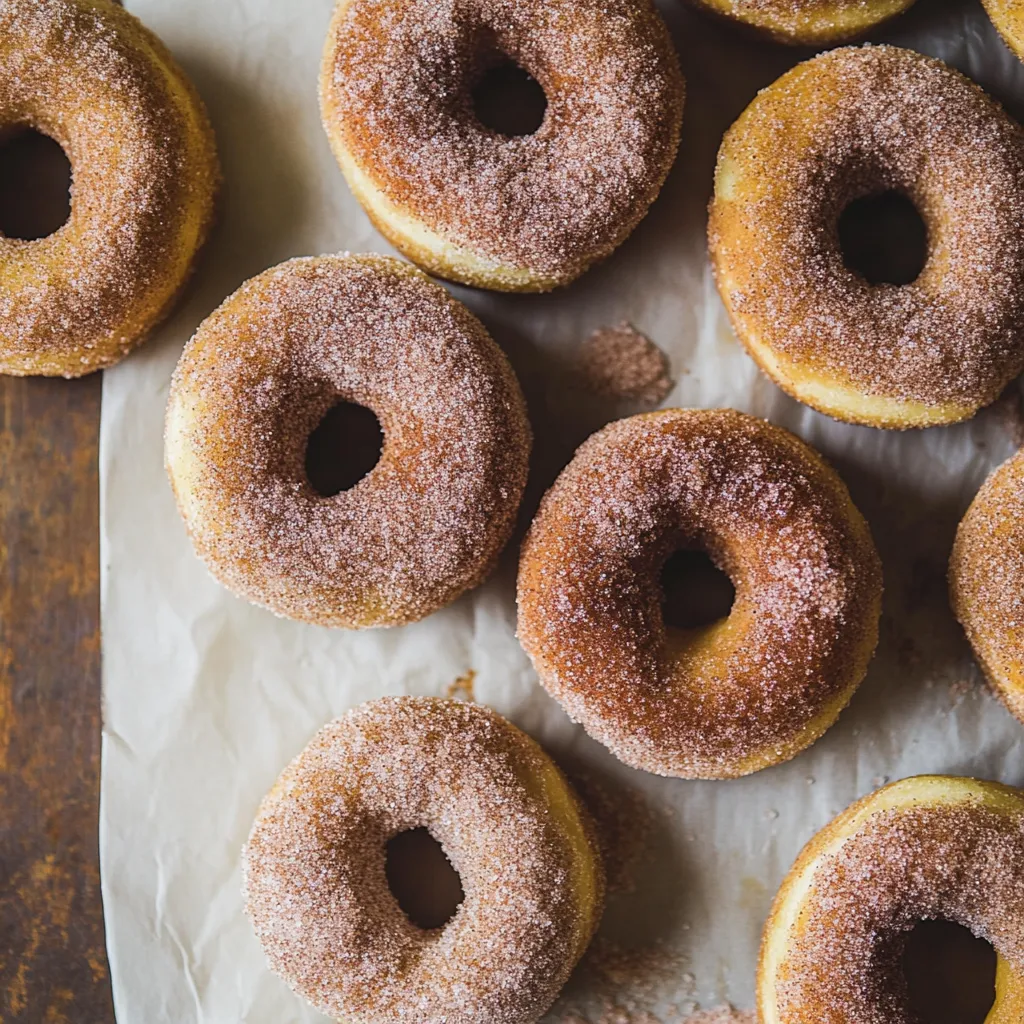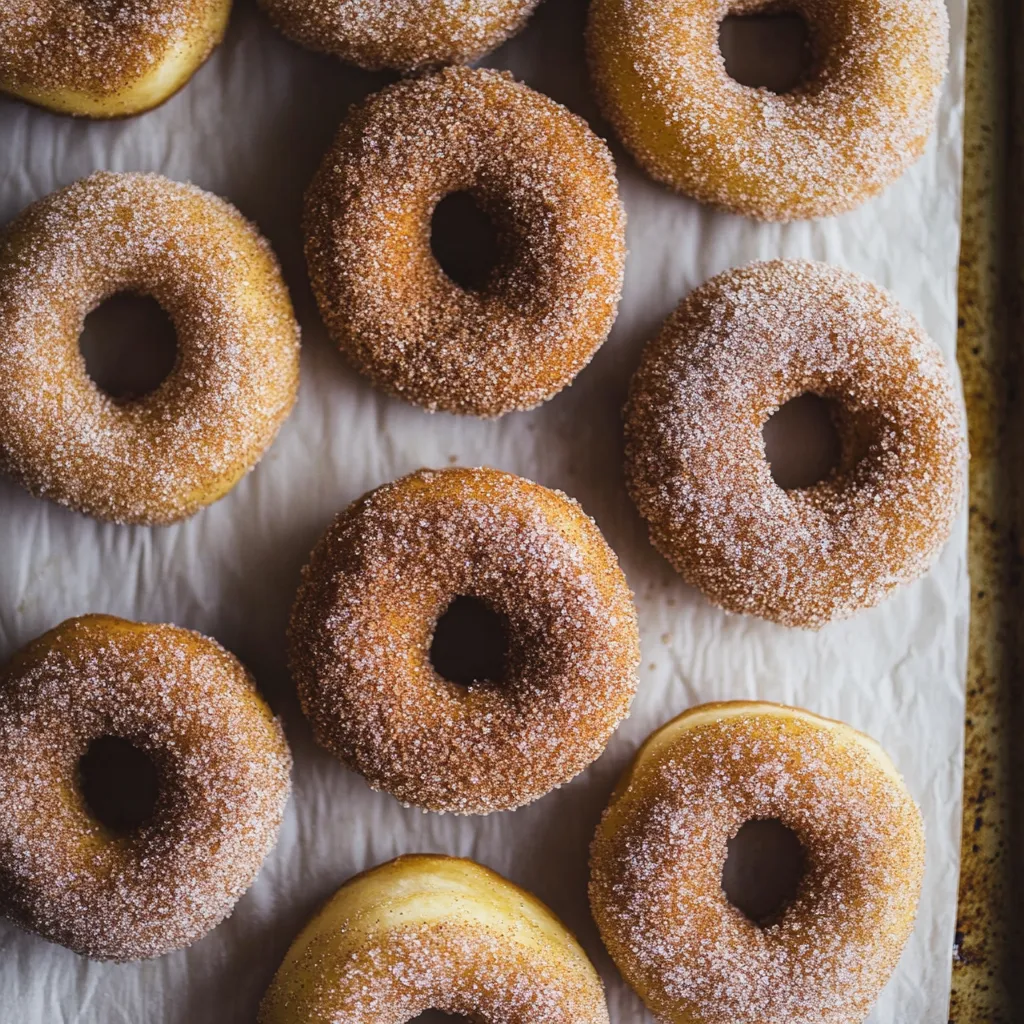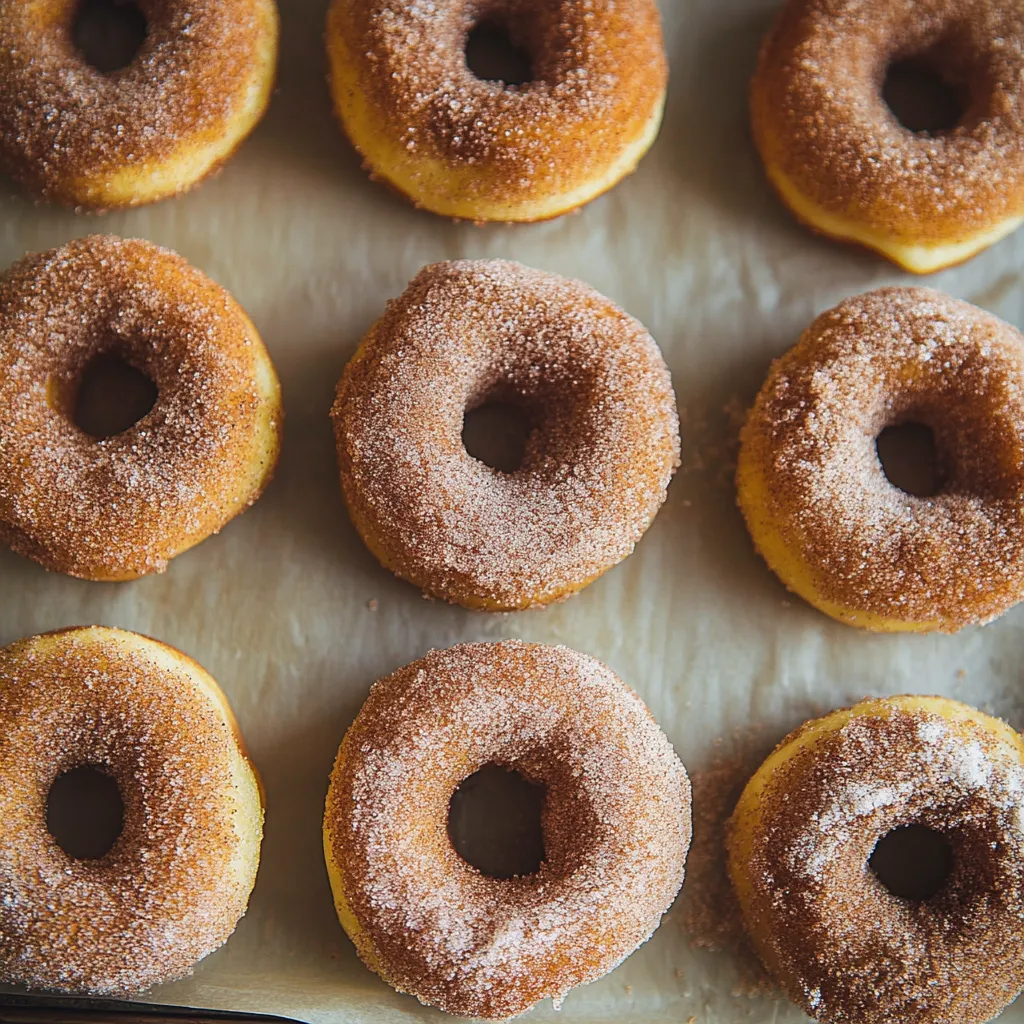 Pin it
Pin it
Reducing apple cider until it concentrates into thick syrup creates donuts that taste intensely of apples and fall spices. The cake donut batter mixes together in one bowl, rolls out easily, and fries up into tender treats with crispy edges. Rolling them in cinnamon sugar while still warm coats every surface with sweet spice that clings perfectly. These taste exactly like the donuts sold at New England apple orchards, except you're making them fresh in your own kitchen for a fraction of the price.
Apple cider donuts became my fall tradition after visiting a Massachusetts orchard and tasting warm donuts straight from their bakery. The combination of concentrated cider flavor, warm spices, and that cinnamon sugar coating created something I couldn't stop thinking about. When I found a recipe and realized the secret was just boiling down the cider to concentrate it, making them at home suddenly seemed possible. Now I reduce cider every October and make batches of these donuts that disappear within hours. My kitchen smells like an apple orchard bakery, and neighbors somehow always show up right when the donuts come out of the fryer.
Ingredients and Why They Matter
For the Donuts:
- Apple cider (2 cups, reduced to ¾ cup): Fresh cider from orchards or grocery produce sections; reducing concentrates the apple flavor dramatically
- Granny Smith, Macoun, or McIntosh apple (1, peeled and grated): Tart apples with good flavor; grate finely so pieces cook through
- Granulated sugar (½ cup): Sweetens the dough
- Brown sugar (½ cup packed): Adds moisture and deeper flavor than white sugar alone
- Unsalted butter (4 tablespoons, softened): Creates tender crumb; salted butter works but reduces added salt
- Large eggs (2, room temperature): Bind everything together and add richness
- Buttermilk (½ cup): Adds tang and keeps donuts moist; make substitute with 1 cup milk plus 1 teaspoon lemon juice or vinegar
- Vanilla extract (2 teaspoons): Enhances all other flavors
- All-purpose flour (3½ cups, sifted): Provides structure; sifting creates lighter texture
- Baking powder (2 teaspoons) and baking soda (1 teaspoon): Leavening agents that help donuts rise
- Ground cinnamon (1½ teaspoons): Warm spice that defines fall flavor
- Ground nutmeg (½ teaspoon): Adds depth and complexity
- Salt (1 teaspoon): Enhances sweetness and balances flavors
For Coating:
- Granulated sugar (1 cup): Base for cinnamon sugar
- Ground cinnamon (2 tablespoons): Mixed with sugar for coating
For Frying:
- Canola or vegetable oil (about 2 quarts): High smoke point oils for deep frying
How To Make It
- Reduce the apple cider:
- Pour 2 cups of fresh apple cider into a medium saucepan. Place over low heat and bring to a gentle simmer. Let it bubble away slowly for 20-30 minutes without stirring much, until reduced to about ¾ cup. You'll know it's ready when it's thick, syrupy, and coats the back of a spoon. Watch carefully toward the end because it can burn quickly once most of the liquid evaporates. Remove from heat and pour into a measuring cup to confirm you have ¾ cup. If you reduced too much, add a bit of fresh cider to reach ¾ cup. Let cool completely to room temperature, which takes about an hour, or refrigerate overnight. This concentrated cider is the secret to intense apple flavor.
- Mix dry ingredients:
- Sift the flour, baking powder, baking soda, salt, cinnamon, and nutmeg into a medium bowl. Whisking together also works if you don't have a sifter. Sifting removes lumps and aerates the flour, creating lighter donuts. Set this bowl aside - you'll add it to the wet ingredients later.
- Cream butter and sugars:
- In a large mixing bowl, use a stand mixer or electric hand mixer to beat the softened butter, granulated sugar, and brown sugar together on medium-high speed for about 2-3 minutes. The mixture should become light, fluffy, and slightly pale in color. This creaming process incorporates air that helps donuts rise. Scrape down the bowl sides with a spatula to ensure even mixing.
- Add wet ingredients:
- Crack the eggs into a separate cup first to check for shells, then add them one at a time to the butter mixture, beating well after each addition until fully incorporated. Pour in the cooled concentrated apple cider, buttermilk, and vanilla extract. Mix on medium speed until everything combines smoothly. Don't worry if the mixture looks slightly curdled from the buttermilk - that's normal and will smooth out when you add the flour.
- Combine wet and dry:
- Add all the dry ingredients to the wet mixture at once. Mix on low speed just until the flour disappears and no dry streaks remain. Don't overmix or the donuts will be tough - stop as soon as everything comes together. Gently fold in the grated apple using a spatula, distributing it evenly throughout the dough. The dough will be soft and slightly sticky, which is correct. Cover the bowl with plastic wrap and refrigerate for at least 1 hour, or overnight. Chilling makes the dough much easier to roll and cut.
- Roll and cut the dough:
- Generously flour a clean work surface and turn out the chilled dough. The dough will still be sticky, so keep extra flour nearby. Use a plastic bench scraper or floured hands to fold the dough over itself a few times, flouring as needed, until it becomes more manageable. Use a rolling pin to roll the dough to ½-inch thickness - not thinner or the donuts will be too crispy instead of cake-like. Dip a 3.5-inch donut cutter in flour and cut out donuts, cutting them as close together as possible. Transfer cut donuts and donut holes to a parchment-lined baking sheet. Gather scraps, re-roll once, and cut more donuts. Don't re-roll more than once or they'll be tough.
- Heat the oil:
- Pour about 3 inches of oil into a large, heavy pot or deep fryer. Heat to 375°F, checking with a thermometer. This temperature is crucial - too cool and donuts absorb grease and stay pale; too hot and they burn outside while staying raw inside. Keep the thermometer in the oil and adjust heat to maintain 375°F throughout frying.
- Fry the donuts:
- Working in batches of 2-3 donuts to avoid crowding, carefully slide them into the hot oil using a slotted spoon or spider strainer. They'll sink, then float back up. Fry for about 2-3 minutes per side until deep golden brown. Use the slotted spoon to flip them once the first side browns. Don't rush this - undercooked donuts are doughy inside. When both sides are golden, lift donuts from the oil, letting excess oil drip back into the pot. Place on a paper towel-lined baking sheet to drain briefly. Repeat with remaining donuts and donut holes. The holes cook faster, about 1-2 minutes per side.
- Coat in cinnamon sugar:
- Mix the 1 cup sugar with 2 tablespoons cinnamon in a shallow bowl or plate. While donuts are still warm - this is crucial - roll each one in the cinnamon sugar mixture, coating all sides completely. The warmth helps the coating stick. Shake off excess and place on a serving plate. Serve immediately while still warm for the absolute best experience, though they stay good at room temperature for 2-3 days in an airtight container.
 Pin it
Pin it
Apple cider became my fall obsession after learning the difference between apple cider and apple juice. Real cider is unfiltered, unpasteurized apple juice with richer flavor and natural cloudiness. The produce section at grocery stores stocks it seasonally, or orchards sell fresh-pressed versions. Reducing it on the stove concentrates all those apple flavors into thick syrup that tastes intensely of apples. My first batch of cider donuts used regular cider without reducing and tasted bland. Once I tried the concentrated version, the difference was dramatic and obvious.
The Reduction Process
Reducing apple cider is simple but requires patience and attention. Starting with 2 cups and ending with ¾ cup means you're removing more than half the liquid. This concentrates the natural sugars and apple flavor while thickening the consistency. The process takes 20-30 minutes over low heat - using high heat burns the sugars and creates bitter flavor. As water evaporates, the cider becomes syrupy and darker. Measuring periodically toward the end prevents over-reduction. Too much reduction makes it too thick and can burn. Too little leaves it weak-flavored. Doing this the night before saves time on donut day and the concentrated cider keeps refrigerated for weeks.
Cake Donut vs Yeast Donut
This recipe makes cake donuts which are fundamentally different from yeast donuts. Cake donuts use baking powder and baking soda for leavening, creating denser texture similar to cake. They mix in one bowl and don't require rising time. Yeast donuts use active yeast and need hours of rising, creating lighter, airier texture. Cake donuts have tighter crumb and more substantial bite. They stay fresh longer than yeast donuts which stale quickly. The apple cider works better in cake donuts because the denser texture can handle the moisture and pieces of apple without becoming soggy.
Frying Safety and Technique
Deep frying requires caution and proper technique. Use a heavy pot with tall sides to prevent oil from bubbling over. Never fill more than halfway with oil. Keep a lid nearby to smother flames if oil catches fire - never use water on oil fires. Heat oil gradually and monitor with a thermometer. Don't leave hot oil unattended. Have a splatter screen ready. Use long-handled tools to add and remove food. If oil smokes, it's too hot - remove from heat immediately. Let oil cool completely before disposing. Have baking soda nearby as backup fire extinguisher. These precautions prevent dangerous accidents.
Make-Ahead Options
This recipe's flexibility for advance preparation makes it practical for busy mornings. Reduce the cider up to a week ahead and refrigerate. Mix the dough, roll, and cut donuts the night before. Place cut donuts on parchment-lined sheets, cover loosely with plastic wrap, and refrigerate overnight. In the morning, let them sit at room temperature for 20 minutes while oil heats, then fry as directed. Alternatively, refrigerate the entire bowl of dough overnight and roll out in the morning. Fried donuts are best eaten within a few hours but keep for 2-3 days in airtight containers at room temperature.
Glazing Alternative
While cinnamon sugar is traditional, a simple glaze creates different presentation. Whisk together 2 cups powdered sugar, 1 teaspoon vanilla, and 2-3 tablespoons milk until smooth and pourable. Dip warm donuts in glaze, letting excess drip off. Place on wire rack to let glaze set. The glaze firms up within 10 minutes. You can also do both - glaze them, let it set, then roll in cinnamon sugar for double coating. Maple glaze works too - replace milk with maple syrup and reduce sugar slightly.
Storage and Serving
Store donuts in an airtight container at room temperature for up to 3 days. They're best within the first 24 hours but remain good longer thanks to the moisture from grated apples and buttermilk. Refresh day-old donuts by warming in a 300°F oven for 3-5 minutes. Don't refrigerate as that makes them stale faster. Freeze unfrosted donuts in freezer bags for up to 2 months. Thaw at room temperature and warm briefly before serving. Serve with hot apple cider, coffee, or cold milk. These make wonderful breakfast treats, afternoon snacks, or desserts.
 Pin it
Pin it
These apple cider donuts represent fall baking at its absolute best - seasonal ingredients transformed through simple techniques into something that tastes special and nostalgic. The smell of frying donuts fills your house with warmth and makes everyone gravitate toward the kitchen. When you bite through that cinnamon sugar coating into the tender, apple-flavored cake underneath, it tastes like autumn itself. Sometimes the best recipes are the ones that create memories and traditions, and these donuts definitely accomplish that goal perfectly every single time you make them.
Frequently Asked Questions
- → Can I bake these donuts instead of frying them?
- Yes, you can bake them at 350°F for about 12-15 minutes, but they won't have the same texture as fried donuts. The outside will be less crispy.
- → Why do I need to reduce the apple cider?
- Reducing the cider concentrates the apple flavor and removes excess moisture, which keeps the donuts from getting soggy and gives them better taste.
- → What if my dough is too sticky to work with?
- This dough is naturally sticky. Use plenty of flour on your work surface and a plastic bench scraper to handle it. Don't add too much extra flour or the donuts will be tough.
- → How do I know when the oil is hot enough?
- Use a thermometer to check that the oil reaches 375°F. If you don't have one, drop a small piece of dough in - it should sizzle and float right away.
- → How long do these donuts stay fresh?
- They're best eaten the same day while fresh. Store leftovers in an airtight container for up to 2 days, but they'll lose some crispness.
- → Can I use a different type of apple?
- Yes, though Macoun or Macintosh work best because they're tart and moist. Granny Smith or Honeycrisp are good alternatives.
- → Do I have to use buttermilk?
- Buttermilk adds great flavor and tenderness. If you don't have it, mix ½ cup regular milk with 1½ teaspoons of lemon juice and let it sit for 5 minutes.
